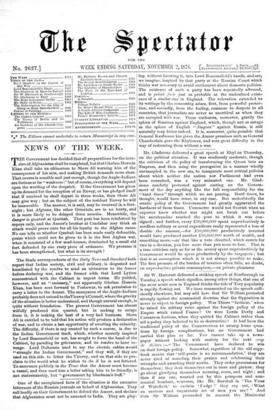Mr. Gladstone delivered a great speech at Rhyl on Thursday,
on the political situation. It was studiously moderate, though the criticism of the policy of transforming the Queen into an Empress, and then using the prerogative in a manner wholly unexampled in the new era, to inaugurate most critical policies about which neither .the nation nor Parliament had even been consulted, was a very animated one. Mr. Glad- stone candidly protested against casting on the Govern- ment of the day anything like the full responsibility for the "hard times" through which we are passing. Hard times, he thought, would have come, in any case. But undoubtedly the erratic policy of the Government had greatly aggravated the hardness of these times. Commerce would not flourish when no exporter knew whether war might not break out before his merchandise reached the port to which it was con- signed; and further, every 210,000,000 spent unproductively in needless military or naval expenditure really represented a loss of double the amount,—for £10,000,000 productively invested would have produced another £10,000,000 worth of wealth, and something more,—so that like a vote diverted, which counts for two in a division, you lose more than you seem to lose. That is a true criticism only so far as the money spent unproductively by Government would be spent productively by the taxpayers ; but that is an assumption which it is not always possible to make. The first pressure of the burden of taxation often falls, no doubt, on unproductive private consumption,—on private pleasures.


































